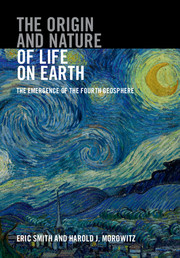Book contents
- Frontmatter
- Contents
- Preface
- Acknowledgments
- 1 The planetary scope of biogenesis: the biosphere is the fourth geosphere
- 2 The organization of life on Earth today
- 3 The geochemical context and embedding of the biosphere
- 4 The architecture and evolution of the metabolic substrate
- 5 Higher-level structures and the recapitulation of metabolic order
- 6 The emergence of a biosphere from geochemistry
- 7 The phase transition paradigm for emergence
- 8 Reconceptualizing the nature of the living state
- Epilogue
- References
- Index
8 - Reconceptualizing the nature of the living state
Published online by Cambridge University Press: 05 June 2016
- Frontmatter
- Contents
- Preface
- Acknowledgments
- 1 The planetary scope of biogenesis: the biosphere is the fourth geosphere
- 2 The organization of life on Earth today
- 3 The geochemical context and embedding of the biosphere
- 4 The architecture and evolution of the metabolic substrate
- 5 Higher-level structures and the recapitulation of metabolic order
- 6 The emergence of a biosphere from geochemistry
- 7 The phase transition paradigm for emergence
- 8 Reconceptualizing the nature of the living state
- Epilogue
- References
- Index
Summary
Here we bring together the empirical regularities from the first five chapters and the stability perspective from Chapter 7 to sketch an integrated theory of the emergence of the biosphere. Further required ideas, taken up in this chapter, include arguments for the importance of modular architecture in hierarchical complex systems, applications of the stability perspective to the problem of hierarchical control, and an explanation of the way modularity supports control by buffering errors. We interpret the subsystem decompositions reviewed in the empirical chapters as modules created by phase transitions, which made possible the emergence of hierarchical control, but dictated the architectures for which stability at the whole-system level was possible. The same basic relation – the affordance of modules that buffer errors – is the mechanism whereby low-level laws have repeatedly constrained the forms and functions of higher-level assemblies in biology. An essential element in the biosphere's emerging distinctness from abiotic Earth systems has been the emergence of individuality, a complex concept instantiated in many ways, and precondition for Darwinian evolution. For us individuality is not primitive, but is an organizational motif that emerges at intermediate stages in systems that already possess significant structure. Therefore Darwinian dynamics also is not a sufficient starting point to define the nature of life. We propose an alternative essence for the nature of life, in which the biosphere as a whole is the defining level of organization, energy transport through covalent bond chemistry is the essential function, and the complexity of the chemical substrate is an essential source of both complexity and stability.
Bringing the phase transition paradigm to life
The patterns presented in the first five chapters suggest that life grew out of geochemistry. Metabolism is the living subsystem closest to the lawfulness of geological processes. The ecosystem is the level of organization that carries the necessary and universal subnetworks within core metabolism, and that has hosted their accretion over geologic and evolutionary timescales.
In Chapter 7 we proposed that biogenesis took the form of a cascade of non-equilibrium phase transitions. Redox stresses, perhaps along with other chemical potentials (protons? phosphates?), forced electron flow through the graph of possible chemical reactions. Autocatalysis (at both network and single-molecule levels), by a hierarchy of first short and then longer loops, created sufficient positive feedback that the flow was concentrated into selective channels.
- Type
- Chapter
- Information
- The Origin and Nature of Life on EarthThe Emergence of the Fourth Geosphere, pp. 539 - 607Publisher: Cambridge University PressPrint publication year: 2016



